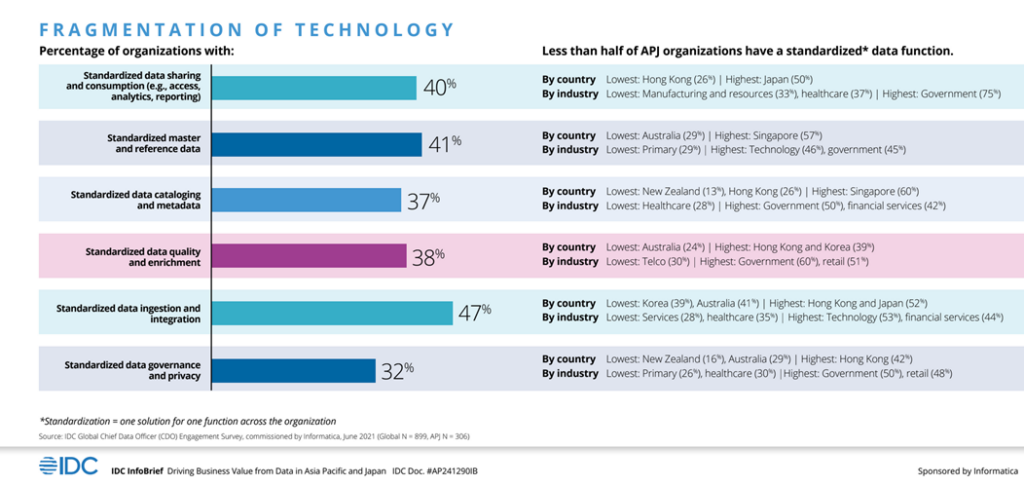According to a global survey’s APJ statistics, data fragmentation may be the region’s biggest barrier to optimal digital transformation next year
To shed light on the critical challenges Chief Data Officers (CDOs) face, their priorities for the coming year, and key performance indicators they should watch in a digital-first world, an IDC infobrief sponsored by enterprise cloud data management firm Informatica has been released.
In the Asia Pacific & Japan (APJ), over 75% of organizations surveyed had already embarked on their digital transformation (DX) journeys, and 70% regularly used multiple clouds, putting the region at the forefront of the world, as far as the sample population data was concerned.
However, despite the data leadership, almost 60% of APJ organizations in the survey felt unprepared to combat the rapid changes during the pandemic. Overall, three APJ themes were discerned in the global (total of 899 respondents in North America, EMA, APJ) CDO survey, the latter population comprising 306 members of ‘the office of the CDO’ in 10 countries including Japan, Hong Kong, Malaysia and Singapore:

-
Data fragmentation and complexity distract from innovation
Enterprise infrastructure will be cloud-first and multi-hybrid for many years, with systems spread across on-premises and multi-cloud environments. The findings showed that:
- 70% of APJ respondents regularly used multiple clouds, and 44% regularly used hybrid clouds
- 82% of APJ respondents were managing over 100 data sources; 32% were managing more than 1,000 sources
- 74% of APJ data executive respondents spent the most time on daily operational management rather than on governance and strategic initiatives
Fragmentation, referring to data spread across multiple sources and many clouds, made discovering, managing and deriving intelligence from data more complex. Respondent organizations with a high level of data maturity generated 250% more business value than less mature respondents, which spent data management time “keeping the lights on”.
-
Importance of operationalizing AI to automate data management
The data showed that data-mature respondents were three times better at operationalizing AI to automate data management activities than less mature respondents.
- 73% of APJ respondents were struggling to manage self-service data
- 37% of APJ respondents had automated data management across the business
- 35% of APJ respondents had operationalized AI for process optimization and automation
Digital leaders in the region considered improving data ingestion and integration capabilities as top priorities as they looked to improve the incorporate of data into decision making.
-
Data leadership roles matter
Organizations in the survey with strong data leadership were three times more likely to be well underway with DX. However, fragmentation and complexity in APJ extended even into executive’s data roles.
- 33% of APJ respondents had enterprise data executives and leaders, while the other 67% distributed responsibility across other C-level positions
- There were no clear reporting lines for data leaders in the region, with a good mix of data leaders reporting to CEOs, CIOs, COOs and CTOs
- Less than half of APJ respondents had a standardized data function despite being the most mature region for data leadership
According to Tony Frey, VP and General Manager (APJ), Informatica: “The winners in digital transformation will be those who can progress beyond mastering data integration to achieve data intelligence. However, APJ data executives in (the survey) were bogged down, hampered in their ability to innovate and realize data’s true value. Data fragmentation is by far the greatest challenge that data leaders will face next year.”
According to IDC, the survey shows that organizations in the survey with higher data maturity were better at using cloud computing and AI to address the primary challenge of fragmentation and complexity and generate higher levels of business value with their data: organizations seeking to become digital leaders should place a strong focus on data leadership.
